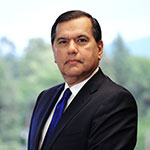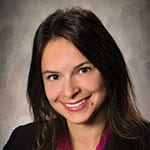Israel Vargas knows a thing or two about second chances. He was born in Chicago but raised in Puerto Rico until his family returned to the city when Vargas turned 13. It was a difficult time for the teenager, who watched a gang war erupt in his neighborhood and city. As the violence escalated, it crept closer to Vargas’s home life. He became addicted to cocaine and started getting into fights. In January 1990, one of his friends shot and killed an opposing gang member. Vargas witnessed the murder. He was convicted as an accomplice and sentenced to 35 years in prison.
Today, after serving more than 12 years of his sentence and devoting his life to community work in Chicago’s minority neighborhoods, Vargas is the assistant provost for college access and targeted recruitment programs at Roosevelt University. One look at his résumé makes it hard to believe that Vargas is the same person who once sat behind bars in a prison uniform. He’s tackled some of the biggest issues impacting Chicagoland’s Latino population including access to education, low-income housing, violence, citizenship, and employment. “My family has always been involved in civic engagement and community development,” he says. “It runs in my blood to reach out to people and help my own kind.” Vargas has worked for, volunteered at, and led organizations such as Parents United for Responsible Education, the Leyden Counsel for Community Action, the Resurrection Project, Cease Fire, the Council on Latino Homelessness, and the San Jose Obrero Mission.
Vargas remembers reevaluating his life while in prison when a Roosevelt University program provided him with the second chance he was looking for. The University entered the criminal justice program to provide inmates with educational opportunities. Vargas was inspired and attended classes to ensure he stayed out of trouble in prison. “The program gave me hope in my heart and helped me believe I could be successful upon my release,” he says. During his sentence, Vargas completed two associate degrees. Upon his release in 2002, he went to 430 South Michigan Avenue to sign up for classes at Roosevelt University. He earned a bachelor’s degree in general studies with a focus on psychology in 2005 and a master’s in 2008—all while raising a family and working full-time.
In early 2014, Vargas returned to his alma mater, accepting a position in outreach to help diversify the student body and bring awareness of higher education to the communities he advocated for. “My university experience gave me hope and the tools to engage my community,” Vargas says. He was just 19 years old when he made one bad decision that impacted the rest of his life. Back then, Vargas wanted to attend college but didn’t know how to prepare himself. “My mom was working, and I didn’t have a role model around,” he recalls. That led him into trouble, and, having experienced it, Vargas knows the stigma that comes with unemployment, disability, homelessness, and crime. “I don’t judge someone or assume they are a bad person if they’ve made bad decisions based on limited access to information,” he says. “My mission is to provide people with enough information to find the right path.”
San Jose Obrero Mission
$1.2 million
the annual funding for San Jose Obrero Mission after five years of Vargas’s work, up from $440,000
80
the number of beds in the women’s house Vargas added to the mission’s existing 40-bed men’s home
450+
the number of people each year whom the mission provides with residential, supportive, therapeutic, and health services
At Roosevelt, Vargas is leveraging his expertise in outreach to improve the university’s adult programs and strengthen civic engagement. He’s developing a social justice inventory and finding opportunities to facilitate those initiatives with student/staff participation. Ultimately, Vargas wants to start a research institute through which students and faculty can address community problems and train workers to respond accordingly. Additionally, he’s creating a college-bound program specifically for Latino high school students. “The university has always been invested in our communities,” says Vargas. “I want to help the less fortunate, and this is a platform from which I can engage Latinos and help them see what higher education can do for their lives.”
In June of 2014, Vargas addressed Gage Park High School students at their commencement ceremony. He encouraged them to take the opportunity they had earned and make the most of it by further refining their knowledge. “I hope I showed them how ready they are to impact their communities and the world,” says Vargas. It was a special day for him—he grew up near Gage Park, and the day served as a reminder of all that he’s been through. It’s moments like those that keep Vargas going in his quest to help and serve his fellow man. “I know where some of these people have been, but I also know what they’re capable of.”
One man’s story in particular hit home. Vargas met Solomon at one of the man’s lowest points. Although Solomon failed the San Jose Obrero Mission interim housing program four times, Vargas believed in him, encouraged his partners to keep working with him, and watched as the man put his life back together and found work as a security guard. “That’s what we do this kind of work for,” Vargas says. “People who feel they have nothing can pick up the pieces.” In 2002, Vargas started his life over. He’s spent every day since helping others do
the same.

